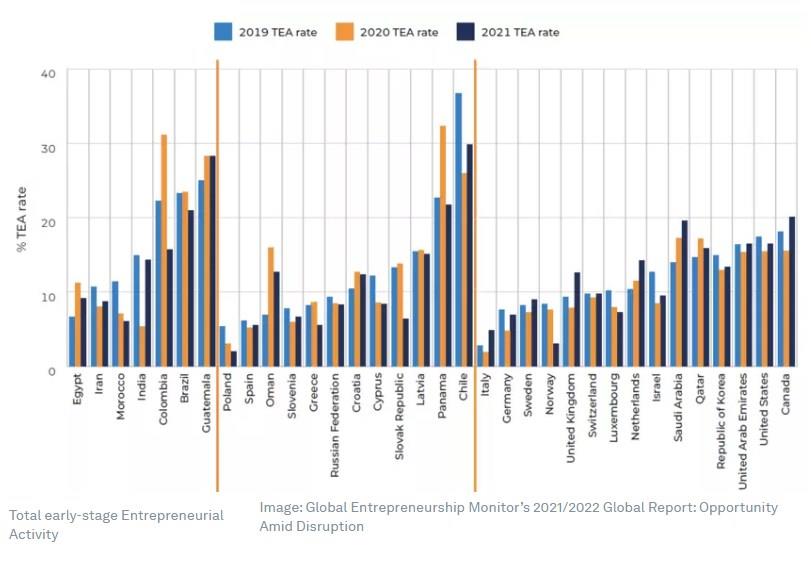by Sreevas Sahasranamam, Aileen Ionescu-Somers and Stephen Hill*
The COVID-19 pandemic has disrupted all walks of life and entrepreneurs are no different. The Global Entrepreneurship Monitor (GEM) 2021/22 report captures entrepreneurial attitudes and trends in countries, illuminating how entrepreneurs and the ecosystem has been coping with the pandemic globally. We highlight six emerging trends in entrepreneurship after COVID-19 based on over 150,000 survey respondents (at least 2,000 respondents from each of the 47 GEM participating countries).
1. Positive entrepreneurial sentiment on opportunities suggests global recovery
There are clear indications of a global economic recovery reflected in positive entrepreneurial sentiments on finding new opportunities and starting a business. In 15 out of these 47 economies, more than half of those starting or running a new business agreed that the pandemic had led to new business opportunities. In 2020, this had been the case for just nine out of 46 economies. Similarly, in 2021, more than one in two entrepreneurs in 18 of 47 economies agreed that starting a business had become more difficult. In 2020, almost twice as many (33 out of 46 economies) had 50% or more of their would-be entrepreneurs agreeing that this was the case.
2. Entrepreneurial activity rates are still lower in most countries compared to pre-pandemic
GEM tracks entrepreneurial activity rates on an annual basis and a comparison of data across 2019, 2020 and 2021 show that entrepreneurial activity has yet to rebound to pre-pandemic levels in most countries. The decline has been more than a half in Poland, the Slovak Republic and Norway. However, there are exceptions, particularly in Saudi Arabia and the Netherlands, both of which experienced increases in entrepreneurial activity in each of the past two years. The following chart shows levels of Total early-stage Entrepreneurial Activity (TEA) in each year for the 34 countries participating in GEM in each of 2019, 2020 and 2021.

3. There is a rising trend of low-growth entrepreneurial activity
Through its Adult Population Survey (APS), GEM captures both entrepreneurial ambitions and growth expectations. Entrepreneurship is central to supporting job creation post-pandemic and high-growth businesses are crucial to achieving this objective. However, we observe a worrying trend of muted growth expectations among entrepreneurs. In a quarter of the economies studied, over half of those starting or running a new business expects to employ no one but themselves in five years. This may be indicative of high levels of “informal survival” businesses, hinting at new start-ups as a means of survival in the absence of alternate income opportunities owing to the pandemic.
4. There is a paradox between perceiving it as easy to start a business and intending to do so
We observe a tricky paradox in certain countries. While many adults perceive that starting a business in their country is easy, only a very small proportion are intending to start one. For instance, in the UK over 70% of respondents agree that it is easy to start a business in that country, however, less than 1 in 10 intend to start a business in the next three years. Similarly in India, over 80% of respondents agree that it is easy to start a business in that country. However, less than 1 in 5 adults expect to start a business in the next three years. In both these countries, over 50% of those seeing good opportunities to start a business report that fear of failure would prevent them from doing so. This suggests a need for informed policy-making to bring about cultural change to boost entrepreneurial intentions and provide more robust support to early-stage entrepreneurs.
5. Digitalization is rising among low-income countries and new entrepreneurs
Pandemic-induced restrictions and improving digital infrastructure have accelerated and increased the prevalence of digital technology adoption among low-income countries, where one in two new start-ups expect to increase the use of digital technologies to sell their products in the next six months. However new entrepreneurs embrace digital technologies more than established business owners in all but three economies: South Africa, France, and the Republic of Korea. There is a need for more incentives and/or training to invest in digital technologies to avoid established businesses being left behind as markets change.
6. Entrepreneurship education in school continues to fail
With its National Experts Survey (NES), GEM captures the view of experts from each participating country on entrepreneurial ecosystem conditions in that country. A very worrying trend here is that experts generally assess entrepreneurial education at school as failing. Of the 13 ecosystem system conditions tracked, Entrepreneurial Education at School was rated last in 39 of the 50 economies participating in the NES in GEM 2021. This could potentially have long-term consequences such as limiting creativity, cultivating a poor understanding of market dynamics, and non-leveraging of new venture creation intentions among adults in the future, in turn hampering economic growth. This ought to be an easy characteristic of the entrepreneurial ecosystem to get right – instead so many seem to be getting it wrong. Let’s make the 2020s the decade when Entrepreneurial Education in School went from being the worst to best rated of the GEM ecosystem conditions.
Conclusions
There is no doubt that the pandemic has hit entrepreneurship hard, with fewer people starting new businesses, and many established businesses failing to survive. Yet there are encouraging signs, as some entrepreneurs seize new and emerging opportunities, including for digital trade. There is much to do to support entrepreneurship, not least in creating role models demonstrating that initial business failure can be the springboard to future success. A good place to start would be in schools, where successive generations have been ill-prepared for a life of entrepreneurial activity.
*Senior Lecturer in Entrepreneurship and Innovation, University of Strathclyde and Executive Director and a GEM 2021/2022 Global Report author, Global Entrepreneurship Monitor and Professor Emeritus and Lead Author of the GEM 2021/2022 Global Report, Sohar University, Oman
**first published in: www.weforum.org




 By: N. Peter Kramer
By: N. Peter Kramer
